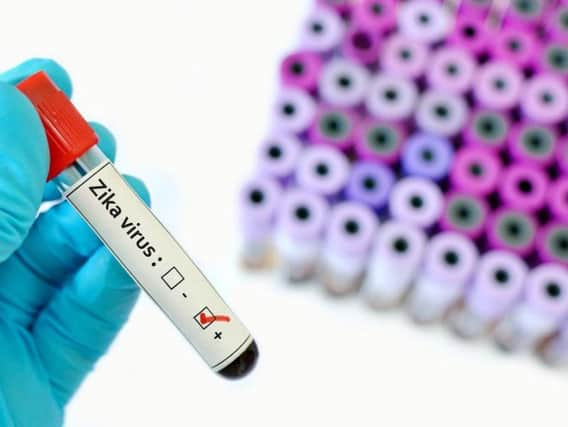Britain commits to fight against Zika as four more UK infections confirmed


The infections are all believed to be ‘travel associated’ and are linked to the pandemic in Central and South America and the Caribbean, where the virus is responsible for a spate of babies being born with abnormally small heads and brain damage.
The virus is transmitted by mosquitoes and can cause microcephaly in unborn foetuses. There is no evidence of microcephaly in any of the cases reported in Britain.
Advertisement
Hide AdAdvertisement
Hide AdPregnant women have been advised to consider avoiding travel to affected countries, and Public Health England continue to assert that the risk to the public in England is “negligible.”
Dr Hilary Kirkbride, travel and migrant health expert at Public Health England, said: “While we may expect to see small numbers of Zika virus infections in travellers returning to the UK, the risk to the wider population is negligible as the mosquito is not found in the UK and the virus cannot be caught from coming into contact with an infected person.
“If you are planning on travelling to any of the infected countries, seek advice from a health professional if you have any questions or concerns.
“If you have recently returned from an area where active Zika transmission is currently reported and have a fever or flu-like illness, seek medical attention without delay to exclude malaria and mention your travel history. If you are pregnant, seek advice from your GP or midwife as you may
require further monitoring.”
Advertisement
Hide AdAdvertisement
Hide AdEarlier today the Medicines and Healthcare Products Regulatory Agency (MHRA) announced its support to the World Health Organisation, which has declared that Zika constitutes a Public Health Emergency of International Concern.
The MHRA will work with the WHO and 20 other health agencies around the world to fight against Zika virus disease and are hoping to enjoy the same level of success that international ollaboration achieved in tackling Ebola.
As the development of specific vaccines for Zika are still at early stage, health organisations are exchanging information on the emerging data about Zika virus infection links to serious health concerns and will work together to review possible investigational vaccine and treatment options.
Zika virus has been found in 21 countries in the Caribbean, as well as North and South America. First detected in monkeys in Africa in 1947, there have been small outbreaks in Africa, Asia and the Pacific. However, in 2015 transmission was detected in Brazil.
Advertisement
Hide AdAdvertisement
Hide AdThe disease is transmitted by Aedes mosquitoes, which are found in all countries in the Americas apart from Canada and Chile. They also spread dengue fever and chikungunya.
The WHO’s regional office, the Pan American Health Organization (PAHO), said: “PAHO anticipates that Zika virus will continue to spread and will likely reach all countries and territories of the region where Aedes mosquitoes are found.”
There is also early evidence of “possible person-to-person sexual transmission.”
Around 80 per cent of infections do not result in symptoms - and even patients who do exhibit symptoms are only likely to suffer from fever and a rash. There is currently no known cure.However, the biggest concern is the potential impact on babies developing in the womb. There have been around 3,500 reported cases of microcephaly in Brazil alone since October.
Advertisement
Hide AdAdvertisement
Hide AdWith the Olympics taking place in Rio de Janeiro in August, Brazil has announced plans to halt the spread of the virus.
Daily sweeps will take place during the Games, and inspections of Games facilities will begin four months before the Olympics start to prevent mosquito breeding grounds. Fumigation, however, could present health problems for athletes and visitors, and would only be carried out on a case-by-case basis.
The British Olympic Association’s medical team has been liaising with specialists at the London School of Tropical Medicine and will be monitoring the situation over the coming months.
The PAHO’s advice is to ensure all containers that can hold even small amounts of water should be emptied and cleaned to prevent mosquitoes breeding.
Also, people should protect themselves by using insect repellent, covering up bare skin, and keeping windows and doors closed.